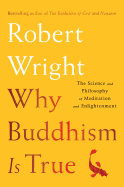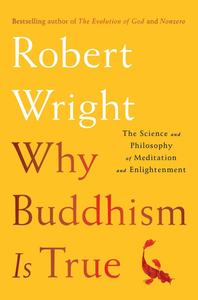
 Don't be put off by the fairly argumentative title of Robert Wright's Why Buddhism Is True. This fascinating book is not in any sense a polemic for the superiority of the Buddhist spiritual worldview over that of other faiths. Instead, it's a well-informed and thoughtful seeker's methodical and sometimes skeptical investigation of key aspects of Buddhist thought and practice--specifically meditation and mindfulness--and the value of those practices when illuminated by the insights of modern psychology and neuroscience.
Don't be put off by the fairly argumentative title of Robert Wright's Why Buddhism Is True. This fascinating book is not in any sense a polemic for the superiority of the Buddhist spiritual worldview over that of other faiths. Instead, it's a well-informed and thoughtful seeker's methodical and sometimes skeptical investigation of key aspects of Buddhist thought and practice--specifically meditation and mindfulness--and the value of those practices when illuminated by the insights of modern psychology and neuroscience.
Wright (journalist, scholar and author of Nonzero and The Evolution of God) first seriously encountered meditation at a one-week silent retreat in 2003, at the Insight Meditation Society, the center founded by well-known American Buddhists and meditation teachers Sharon Salzberg, Joseph Goldstein and Jack Kornfield. Since that time he's become a faithful practitioner, convinced of meditation's value as a "tool for examining our stories carefully, from the ground up, so that we can, if we choose, separate truth from fabrication."
With that practice at its heart, the focus of Why Buddhism Is True is on what Wright calls Buddhism's "naturalistic" elements, rather than its "more exotically metaphysical parts," like reincarnation, but by no means does he duck complexity when considering core tenets of Buddhist belief. For that reason, when tackling Buddhist concepts of the human mind and subjects like not-self (a phenomenon he advises beginning meditators not to take too seriously) and emptiness, Wright's book can be a deep dive. As he recognizes, "if you don't like paradox, maybe Eastern philosophy isn't for you."
Wright is at his most engaging and accessible when he's recounting his personal encounters with mindfulness practice, much in the manner of ABC News reporter and meditation evangelist Dan Harris's memoir, 10% Happier. While this book is much more than a meditation "how-to" manual, Wright does offer practical advice to novice meditators. His description of some of his more challenging meditation experiences, like the one involving a snoring fellow meditator, display his dry wit.
Whether it's a deluge of smartphone apps, enthusiastic celebrity testimonials or the embrace by corporate leaders eager to improve employee productivity and satisfaction, meditation and mindfulness unquestionably are hot today. Robert Wright isn't interested in jumping on any of these bandwagons. Rather, in a style that's serious without being sober, he makes a persuasive case for his belief that "Buddhism's diagnosis of the human predicament is fundamentally correct, and its prescription is deeply valid and urgently important." Regardless of their own religious or spiritual roots, many open-minded readers who accompany him on this journey will find themselves agreeing with him. --Harvey Freedenberg, attorney and freelance reviewer
Shelf Talker: Journalist and scholar Robert Wright offers a useful introduction to the practice of meditation and mindfulness in the Buddhist tradition.

